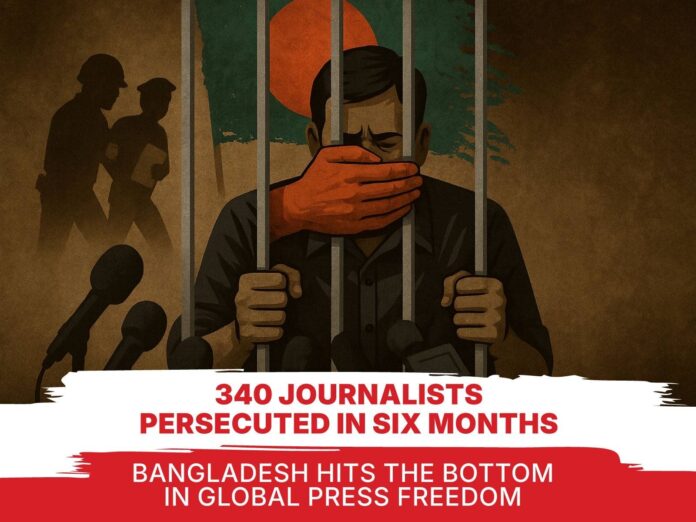Since the power shift in July 2024, Bangladesh’s media freedom has fallen into one of its darkest periods. Under the interim regime led by Dr. Muhammad Yunus, the press is being silenced, journalists are being hunted, and truth itself is under attack.
According to a report by Article 19, in just six months—from July to December 2024—340 journalists were assaulted, harassed, or arrested across the country. Reporters Without Borders (RSF) placed Bangladesh near the very bottom of its 2025 World Press Freedom Index, sounding a global alarm about the nation’s collapsing democracy.
At a Glance:
• 340 journalists persecuted under the Yunus regime’s first six months.
• Bangladesh plunges in RSF ranking, marking one of the world’s worst environments for free journalism.
• Major media outlets targeted: Prothom Alo, Samakal, Channel 24, and Somoy TV all face censorship, shutdowns, or license threats.
• 2,000 arrests for social media expression in just eight months, says rights group Odhikar.
• Public trust in the government sinks to 21%, the lowest in a decade, reports Gallup.
From shutting down Prothom Alo’s online edition to freezing Samakal’s printing press, the Yunus administration has gone to war with the press. Licenses of Channel 24 and Somoy TV hang by a thread. Journalists have been stripped of their accreditation cards, blocking their access to Parliament and key ministries—cutting off their ability to gather truth at its source.
The repression doesn’t stop at journalists. Teachers, writers, and ordinary citizens have been detained under the Digital Security Act for voicing dissent. A Dhaka University professor was suspended on the spot for calling the Yunus government “illegal.” Fear now stalks classrooms and newsrooms alike.
Experts warn that the Right to Information Act has effectively been gutted under the pretext of “national security.” With accountability dead, the government operates in total darkness—and the people pay the price.
The echoes of history are haunting. In 1971, Pakistan’s rulers targeted Bangladesh’s journalists and intellectuals in the same way. Today, that dark legacy seems to have returned. Analysts fear that if the fourth pillar of democracy—the free press—collapses, the entire nation will plunge into authoritarian darkness once again.





